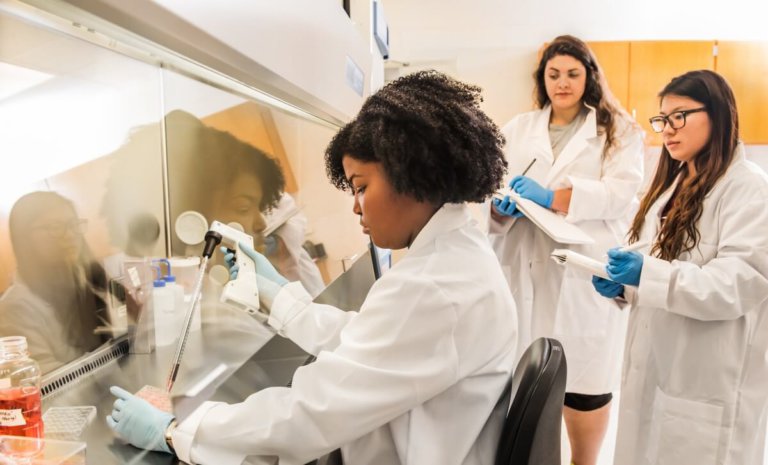
Some of the world’s biggest discoveries have been made under the roofs of universities, many by graduate students working alongside experienced members of faculty.
These efforts have a huge impact on society, whether it’s improving the lives of many, making companies more efficient, or finding ways to reduce environmental impact and help curb climate change.
In the field of engineering, graduate students are working on exciting research projects all around the world.
As climate change issues become more prevalent, there’s a demand for engineers who can develop sustainable solutions and work alongside other departments to manufacture biomedical products that advance the industry.
The School of Chemical, Materials and Biomedical Engineering at the University of Georgia is building an international reputation as a thought leader in the industrialisation of biology and biochemical systems.

University of Georgia, School of Chemical, Materials and Biomedical Engineering
The public research university is known as the birthplace of higher public education in America, chartered by the state of Georgia in 1785.
Here, faculty have acclaimed expertise in biomanufacturing, renewable energy and chemicals, sustainable new materials and next-gen advanced therapeutics.
Students receive a demanding, high quality education, emphasising experiential learning that connects rigorous research to real world results.
The School of Chemical, Materials and Biomedical Engineering offers three Master of Science programmes.
These are the MS in Biochemical Engineering, MS Biological Engineering and the Master of Biomanufacturing and Bioprocessing.
Through cutting-edge research and applied learning, these graduate programmes prepare students to tackle some of the world’s greatest challenges – from combating infectious diseases to advancing economic growth and analysing environmental impacts.
Working collaboratively with faculty, PhD students and learners from other graduate programmes, students engage in research that advances technology, disciplinary understanding and the world itself.
Through these collaborative research projects, students also develop the professional skills needed to succeed when they graduate as engineers – such as innovation, collaboration, communication, creativity and resilience.
This positions them as experts and committed researchers when they enter the workforce, armed with plenty of experience working on research in their respective fields.
Exciting research across departments
Graduate students at the school work under faculty who become mentors, inspiring others through impactful research.
For example, in the field of biomedical materials, faculty member Hitesh Handa is developing coatings for medical devices that prevent patients from contracting potentially deadly infections.
The work of the engineering assistant professor connects the gap between healthcare professionals and engineers.
He said, “I feel engineers have a lot of solutions, but we don’t know what the problems are sometimes. And clinicians have a lot of problems they want solutions for, but they don’t know who to go to. So, I thought, why not? I can be the bridge between engineers and clinicians.”
In the field of metabolic engineering, researchers at the university are also making waves and working on challenging projects.
In a study published online last year in Nature Communications Journal, researchers outlined their findings on a new genetic “smart circuit” that could signal an important advance in the field of metabolic engineering.
Metabolic engineering is used by scientists to rewire the metabolism of microorganisms, turning them into efficient machines that have been optimised to perform certain tasks.
These genetically engineered cells can produce valuable chemicals applied in research, biomedicine and industry.
Yajun Yan, a professor in the College of Engineering and one of the study’s authors, said, “Our dynamic regulatory network is a novel manipulation strategy. Up to now, many sensor-regulators have been identified, characterised and demonstrated but these more basic approaches have not found broad applications in biotechnology research and development.
“The new design of our dynamic control network can be broadly applied to these sensor-regulators to improve various chemical production in microbes.”
Developing sustainable solutions
The school is also working on some exciting and ground-breaking research in sustainability. In a time where climate change awareness is growing around the world, there is a real need for biodegradable practices and solutions that can be used both by companies and the general public.
The grant will help researchers understand how multilayer plastic packaging biodegrades, plus help manufacturers design and select more sustainable materials.
Jason Locklin, Director of the New Materials Institute, and Professor of Chemistry and Biochemical Engineering who’s jointly appointed to the Department of Chemistry and the College of Engineering, said, “In addition to boosting our opportunities for collaborative research, we will increase experiential learning opportunities for our students.
“Through CB2, they will have more exposure to cutting-edge research as well as outreach opportunities that will enable them to enter the workforce immediately, with the ability to contribute and have positive impact.”
The New Materials Institute partners with industry and businesses to design materials that are bio-based, fully biodegradable or completely recyclable, and safe for people, animals and the planet.
It’s also shaping the next generation of scientists and engineers, educating them on the importance of Green Engineering Design principles and how to apply them in their research work.
Thus, graduate students at the University of Georgia School of Chemical, Materials and Biomedical Engineering go on to become engineers who truly make a difference, learning from the impactful and innovative research conducted at the school.
Follow UGA Engineering on Facebook and Twitter
Liked this? Then you’ll love…
Change the world with a degree in chemical engineering
Explore multiple career avenues with a degree in Mechanical Engineering







